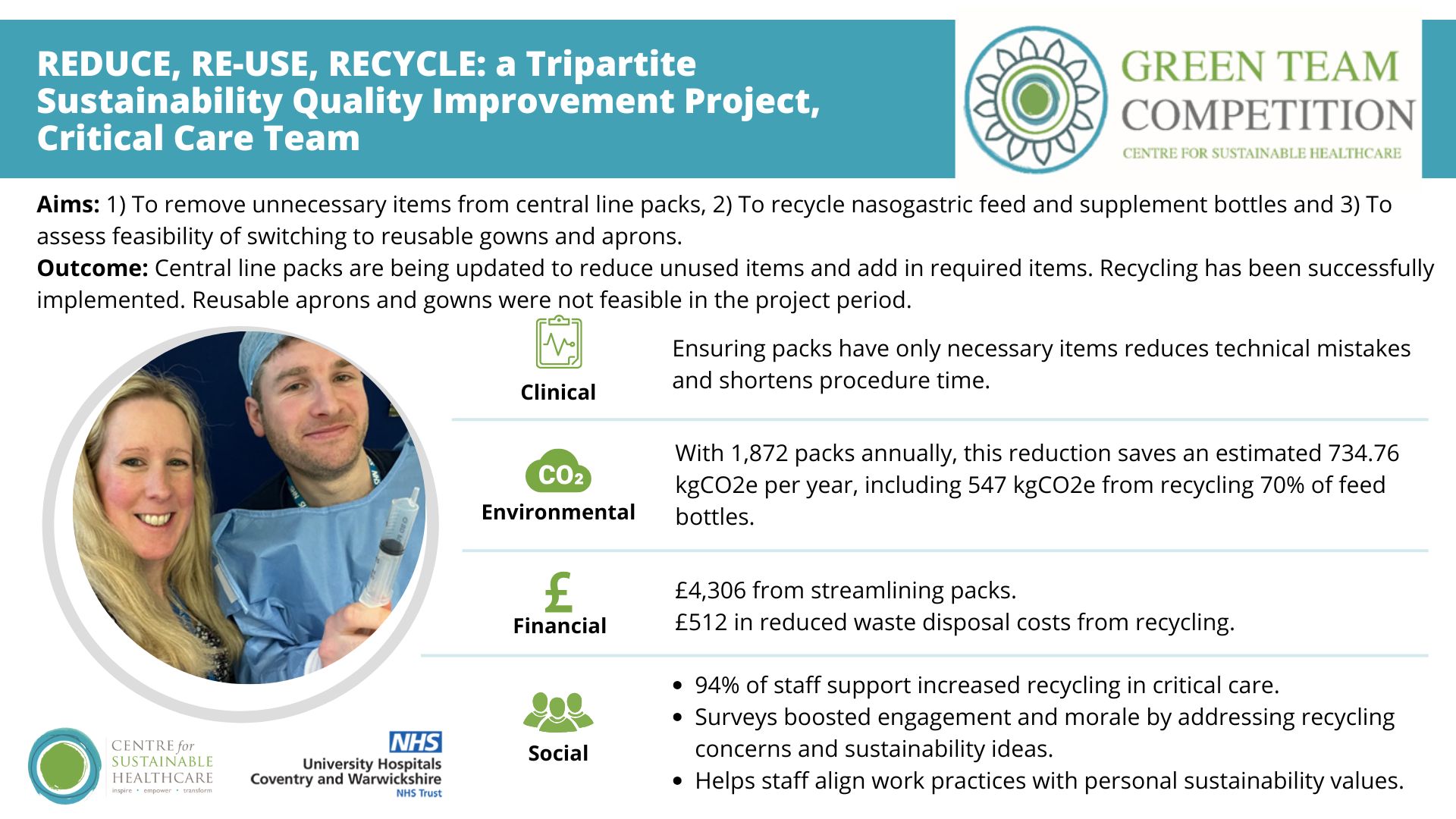Project completed as part of the 2024 Coventry and Warwickshire Green Team Competition.

Team Members:
- Dr Anthony Harding
- Dr Kate Laver
Setting / patent group: Critical care unit
Issue:
- Central Line Packs: Unnecessary equipment in pre-prepared CVC insertion packs leads to waste and unnecessary carbon emissions, while complicating procedures for clinicians.
- Single-Use PPE: Disposable gowns and aprons in critical care contribute significantly to carbon emissions, with high consumption, especially of aprons.
- Clinical Waste recycling: Nasogastric feed and supplement bottles, often disposed of in clinical waste, are not being recycled, resulting in higher carbon footprints and costs from incineration.
Intervention:
Central Line Packs: Simplified CVC packs were created based on clinician feedback through surveys and collaboration with the critical care equipment lead and pack manufacturers.
Single-Use PPE: We investigated the feasibility of switching to reusable gowns and aprons in critical care by conducting a literature research, engaging with staff and manufacturers and IPC. Due to barriers including cost and no on site laundering facilities - we did not continue with this project.
Clinical Waste recycling: We implemented a recycling program for nasogastric feed and supplement bottles. Staff were engaged and educated via surveys, briefings, and posters. Recycling bins were added to key clinical areas. A trial was conducted to monitor the effectiveness of the new recycling system.
Results
Clinical Outcomes:
- Central Line Packs: Streamlined packs improve safety by reducing cognitive load for clinicians and ensuring necessary items (skin disinfecting applicators) were included in the packs, preventing procedural errors.
- Clinical Waste recycling: No direct impact on patient outcomes
Environmental sustainability:
- Central Line Packs: Removing unnecessary items resulted in a reduction of 0.3925 kgCO2e per pack. With 1,872 packs annually, this saves an estimated 734.76 kgCO2e per year.
- Clinical Waste recycling: Recycling nasogastric feed and supplement bottles during a 2-week trial reduced CO2e emissions by 70%, saving 21.02 kgCO2e. If implemented year-round, this could save 546.52 kgCO2e annually.
Economic Sustainability:
- Reduce: The revised packs from the original supplier would save £10,689 annually, while the new supplier would save £4,306 annually.
- Recycle: The recycling initiative saved £29 in disposal costs over two weeks. Extrapolated, this would result in annual savings of £512.
Social Sustainability: All three projects increased staff engagement and morale. 94% of staff supported the sustainability initiatives, and surveys revealed that many felt more motivated to recycle and reduce waste at work after the projects were introduced.
Key learning point
The key learning from this sustainability initiative in critical care is that smaller, quicker projects, like the recycling of feed and supplement bottles, can provide immediate environmental and financial benefits, while larger projects, such as transitioning to reusable PPE, require more time, investment, and careful planning to overcome logistical and financial challenges. Engaging staff through surveys and involving them in decision-making was crucial to gaining support and improving morale. The success of the recycling project, in particular, showed the importance of aligning sustainability efforts with staff workflow and education, highlighting the potential for broader change through simple, targeted actions
Please log in or sign up to comment.